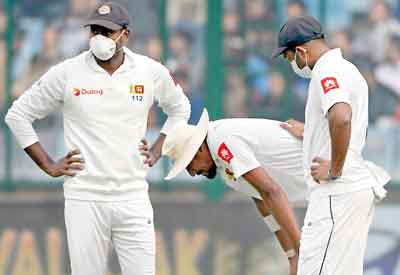The risk is higher for sportsmen – Prof. Arjun de Silva
 A medical expert this week urged the International Cricket Council (ICC) to look more seriously into players’ health after cricketers of both Indian and Sri Lankan teams were exposed to toxic smog during the third and final Test in the Indian capital.
A medical expert this week urged the International Cricket Council (ICC) to look more seriously into players’ health after cricketers of both Indian and Sri Lankan teams were exposed to toxic smog during the third and final Test in the Indian capital.
His comments came a few days after the Indian Medical Council highlighted the dangers of players being exposed to what they termed as ‘very poor’ air quality. At least two players vomited on the field—Suranga Lakmal and Mohammed Shami—and several players, particularly the fast bowlers, showed great discomfort during the five-day match.
“There has been lots of discussion as to why it affected the Sri Lankan cricketers and not the home side,” observed Prof Arjuna de Silva, a member of the Sri Lanka Cricket (SLC) medical panel. “When you first smoke a cigar, you’ll cough but once you get used to it, there won’t be any discomfort. This is the simplest answer. The Indians are used to these conditions but not our players.”
“But this is something we should not get exposed and or accustomed to,” he added. “The onus is on ICC to protect the health and well-being of the players.”
Fueled by a false sense of nationalism and patriotism, many Indian spectators refused to admit that the pollution in their capital did pose a huge health risk to human beings. They were joined by the Indian Cricket Board’s Acting President CK Khanna who dismissed Sri Lanka’s concerns after Dinesh Chandimal and his charges took to the field with masks.
“If 20,000 people in the stands did not have a problem and the Indian team did not face any issue, I wonder why Sri Lankan team made a big fuss,” Khanna told reporters. “I will need to talk to the Secretary and ask him to write to the Sri Lanka Cricket.”
Former Indian opener Virendra Sehwag thought the players were scripting a drama to disrupt play to deny Indian skipper Virat Kohli his maiden triple century without understanding that Sri Lankan cricketers were only making a health statement due to the prevailing atmosphere.
Air quality in Delhi has remained ‘very poor’ during the Test with toxic smog disrupting play at the Feroz Shah Kotla Stadium several times. In order to escape the pollution, Sri Lanka cricketers wore masks for the first time in the history of the game.
“Exposure to such conditions increases the risk of lung and heart diseases and it might have life-long repercussions,” Prof de Silva said. “The risk is higher for sportsmen and women. I personally believe cricket should not be played under these circumstances. Players’ health and safety is of paramount important and it’s the responsibility of the ICC to intervene in such situations.”
Despite the smoggy conditions, the match went on for all five days, placing the health of cricketers at risk. But SLC has not lodged an official complaint with their neighbour or with the ICC for obvious reasons..
“How can we upset India?” a senior SLC official asked. “Rubbing them up the wrong way will have far-reaching financial implications. We cannot afford to have such repercussions.”
Sri Lanka played India twice this year and will be meeting them once again in March in Sri Lanka for a tri-series to celebrate country’s independence from British rule. The forecasted revenue from the series is around US$ 6 million.
 Meanwhile, the ICC said they have asked its medical committee to look into the matter. “The ICC has noted the conditions in which the Delhi Test was played and has already requested the issue is considered by the medical committee for guidance should the situation arise in future. The matter is likely to be discussed in February’s ICC meetings,” the ICC wrote to the Sunday Times, in response to questions on its stand.
Meanwhile, the ICC said they have asked its medical committee to look into the matter. “The ICC has noted the conditions in which the Delhi Test was played and has already requested the issue is considered by the medical committee for guidance should the situation arise in future. The matter is likely to be discussed in February’s ICC meetings,” the ICC wrote to the Sunday Times, in response to questions on its stand.
It may be the first time play was interrupted in an international match by smog. But two first class matches were called off in Delhi last year owing to the pollution.
“There is good reason to drop this venue during the winter when pollution levels reach hazardous levels,” Prof de Silva insisted. Rain and poor light are taken into consideration when determining playing conditions. The ICC might have to include quality of air in future.
According to the Indian Medical Association, “The safe levels of atmospheric particulate matter (PM), according to the World Health Organisation (WHO) air quality guidelines, are 20 µg/cu mm (annual mean) for PM10 and 10 µg/ cu mm (annual mean) for PM2.5.”
“If the air quality index (AQI) is between 151 and 200, it is recommended that outdoor exercises should be reduced. If the AQI is between 201 and 300, all outdoor activities and sports should be reduced. If the AQI is more than 300, all outdoor exercise and activities should be avoided as much as possible. If the AQI crosses 400, indoor activities too should be reduced and no exercise even at home is recommended.”
The air quality index on the day in question was registered as “hazardous”, with PM 2.5 level measured at 316 by aqin.org.


